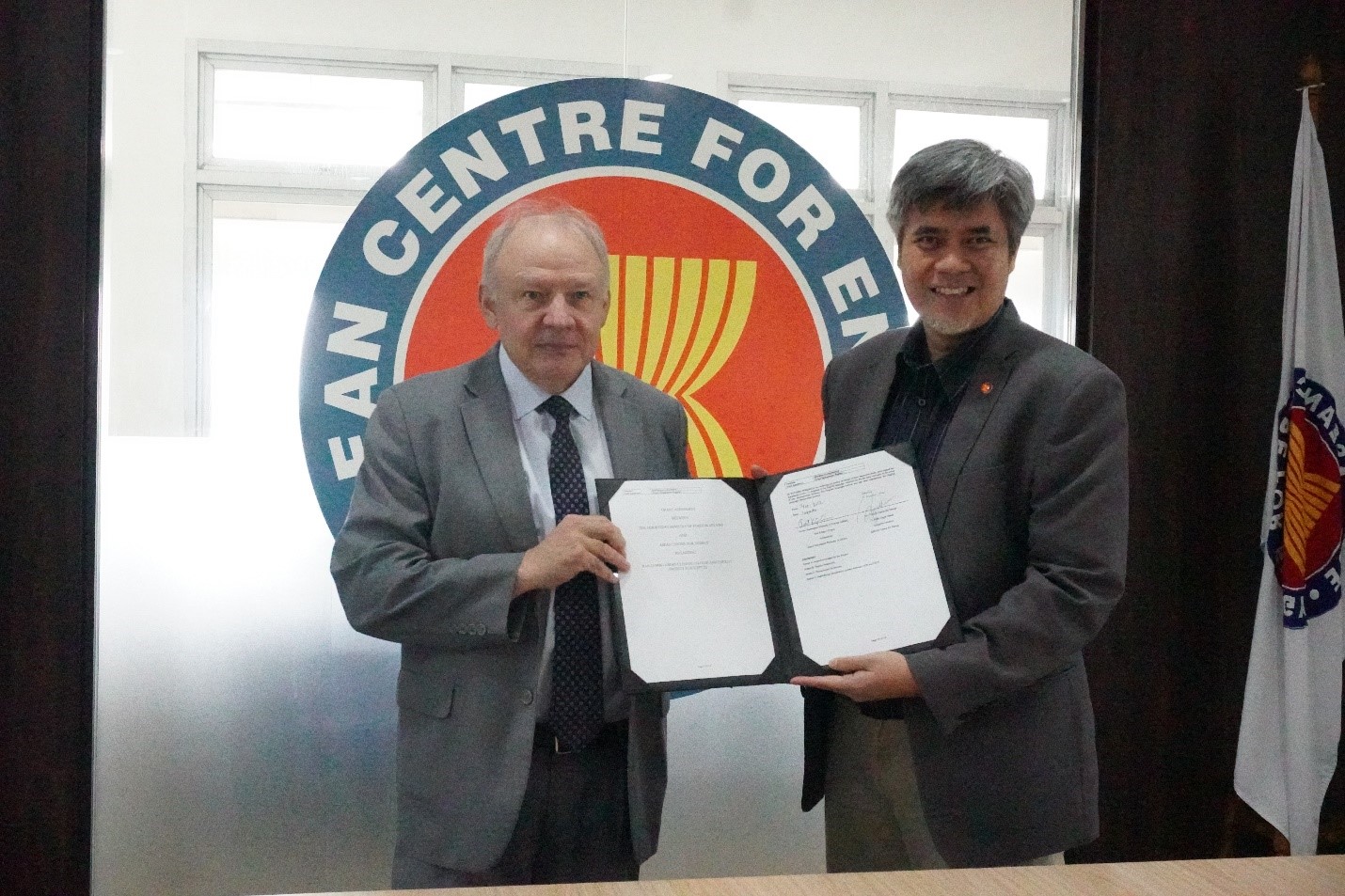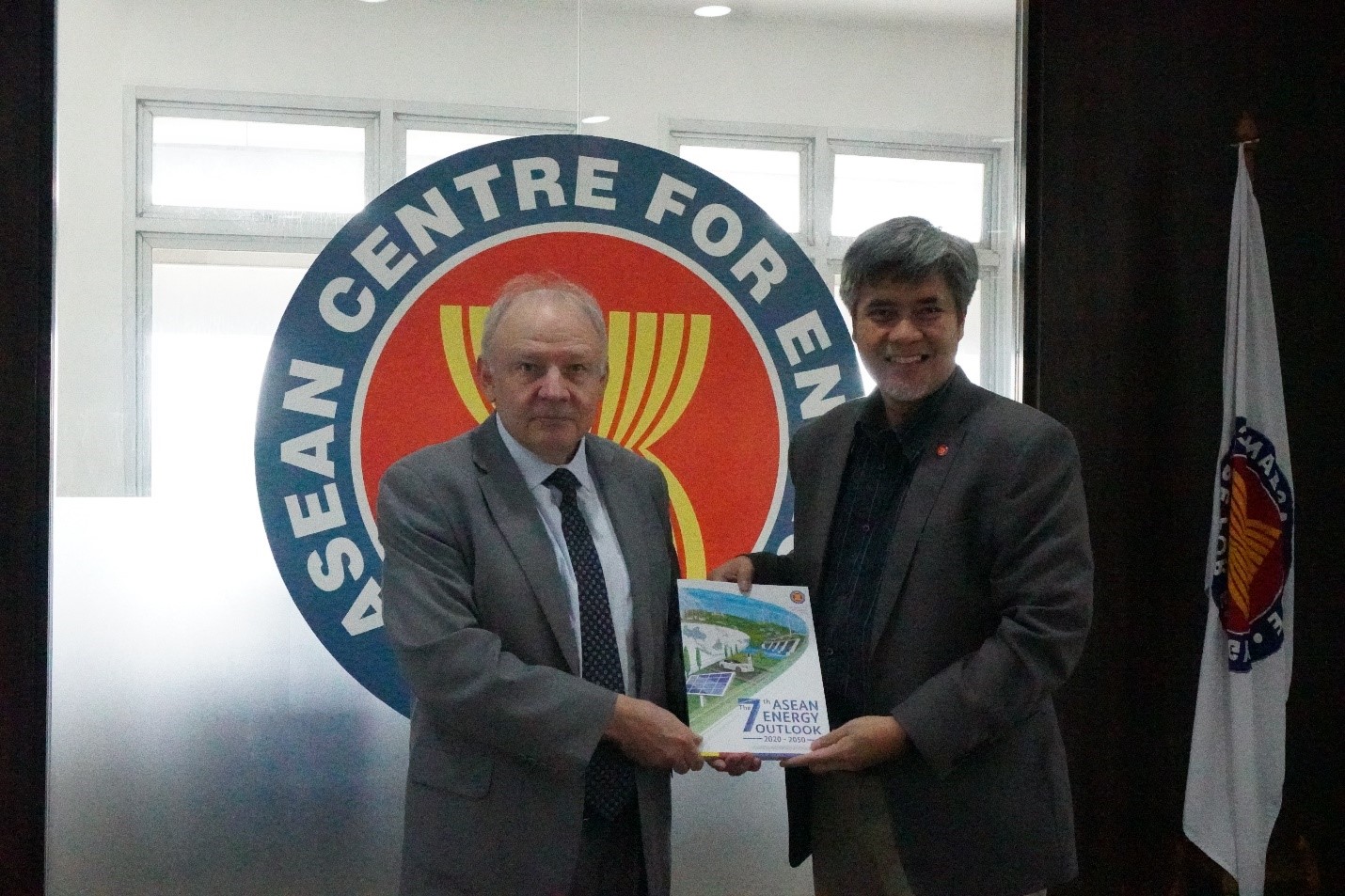Jakarta, 10 November 2022
The Ambassador of Royal Norwegian Embassy in Jakarta, Rut Kruger Giverin, and the Executive Director of ASEAN Centre for Energy, Dr Nuki Agya Utama, have signed an MoU to strengthen ASEAN and Norway’s partnership on energy and climate.

Ambassador of Norway to ASEAN, Kjell Tormod Pettersen (left), and Executive Director of the ASEAN Centre for Energy (ACE), Dr Nuki Agya Utama are holding the signed agreement of the ACCEPT Phase II.
Norway reaffirms its commitment to strengthening cooperation with ASEAN during the 7th Meeting of the ASEAN-Norway Joint Sectoral Cooperation Committee under the ASEAN-Norway Sectoral Dialogue Partnership. In the energy sector, Norway agreed to support the region by continuing energy cooperation under the ASEAN Climate Change and Energy Project phase 2 (ACCEPT 2). Co-Charis of the ASEAN-Norway Joint Sectoral Cooperation Committee (AN-JSCC) have given their approval for the ACCEPT Phase II through the letter dated 28 October 2022, as the project has been endorsed to be implemented under the funding support of the Norwegian-ASEAN Regional Integration Programme (NARIP).
The regional-led partnership will help the ASEAN Member States to align energy and climate policy to accelerate the energy transition in ASEAN more effectively. The agreement focuses on helping ASEAN’s energy transition to low carbon energy systems and thereby contribute toward global carbon neutrality or net zero in the coming years. The ACCEPT2 has three main outcomes. Outcome 1 is to advance knowledge sharing on energy and climate nexus in ASEAN, thereby contributing ASEAN’s capacity to move towards a low-carbon economy. Outcome 3 is to strengthen regional structure capacity and gender equality on the energy-climate nexus.
Outcome 1 focuses on sharing information about energy and climate nexus among the policymakers, improving the coherence of energy and climate policy through policy-relevant studies and conducting science-policy-business forums and conferences. Outcome 2 focuses on enhancing practical knowledge of policymakers on and developing energy system modelling for low-carbon economy. Outcome 3 focuses on developing regional knowledge hubs on energy-climate with integrated dissemination activities and promoting gender equality in the energy sector.
The partnership is a long-term agreement between the Royal Norwegian government and ASEAN from 2018. Phase 1 of the partnership named ASEAN Climate Change and Energy Project (ACCEPT) has been accomplished from November 2018 to March 2022. Meanwhile, phase 2, called ACCEPT2, will be implemented from November 2022 to October 2026.

Dr Nuki Agya Utama of ACE (right) presents the 7th ASEAN Energy Outlook, a flagship ACE report supported by ACCEPT Phase I.
As a part of the celebration of the partnership, a seminar on ASEAN-Norway Partnership on Energy and Climate was held on 11 May 2022 in Jakarta, Indonesia. The seminar was opened by ACE’s Executive Director, Dr Nuki Agya Utama, highlighting that “Regional and international commitments to tackle climate issues have become more ambitious by the urgent need to address climate change”. A keynote speech has been delivered by H.E. Satvinder Singh as the Deputy Secretary-General of ASEAN for ASEAN Economic Community at ASEAN Secretariat, mentioning that “Given the current geopolitical developments, it is more apparent that it is critical for us to balance energy transformation efforts and ensure stability and energy security and at the same time affordability and inclusivity of energy sources for the people”. The latest keynote speech was delivered by H.E. Henrik Thune, the Deputy Foreign Minister of Norway, reaffirming Norway’s commitment to support the energy transition through several targets. The targets include reducing emissions by 50-55% by 2030 and further reduction to 90-95% by 2050, double climate finance by 2026, and triple adaptation finance.
The panel discussion has invited Marie Gail de Saigon, Assistant Director and Head of Energy and Mineral Division of ASEAN Secretariat; Dr Kamia Handayani, VP Climate Change and Safeguard PT PLN; Ir Yudo Dwiwanda Priadi, expert staff of strategic planning at Ministry of Energy and Mineral Resources of Indonesia; and Dr Filda Citra Yusgiantoro, chairperson of Yusgiantoro Center. The panel highlighted that the importance of acknowledging the risks and challenges in transition energy, pacing to capitalize renewable energy resources as soon as possible since currently still heavily rely on fossil fuel, financing is the key decision factor for energy policy development, and the requirement of top-to-bottom approaches to win the hearts of local communities and understand their circumstances.
Framework of the ACCEPT phase 2 has been built on the momentum from the 26th United Nations Framework Convention on Climate Change (UNFCCC) Conference of the Parties (COP) where the 26th COP was arguably important in signalling Southeast Asia’s growing ambition for a low-carbon economy. Going further, by the end of COP26, eight out of ten ASEAN Member States (AMS) had pledged to reach net-zero emissions with Vietnam and Thailand announcing their aspirations at the conference following announcements by Lao PDR, Indonesia and Malaysia in the run-up to COP26. Meanwhile, Brunei Darussalam, Myanmar, and Singapore were among the first movers to announce net-zero targets as early as last year.
The COP27 held in Sharm El Sheik, Egypt which was just ended, also provided the insight on the importance of the project. Previously, ASEAN released ASEAN Joint Statements on Climate Change to the 27th Session of the Conference of the Parties to the United Nations Framework Convention on Climate Change (UNFCCC COP-27).
Detailed information on the profile and achievements of the ACCEPT Phase I can be found at https://accept.aseanenergy.org/.
We welcome the collaboration, hence please feel free to contact Beni Suryadi at [email protected].